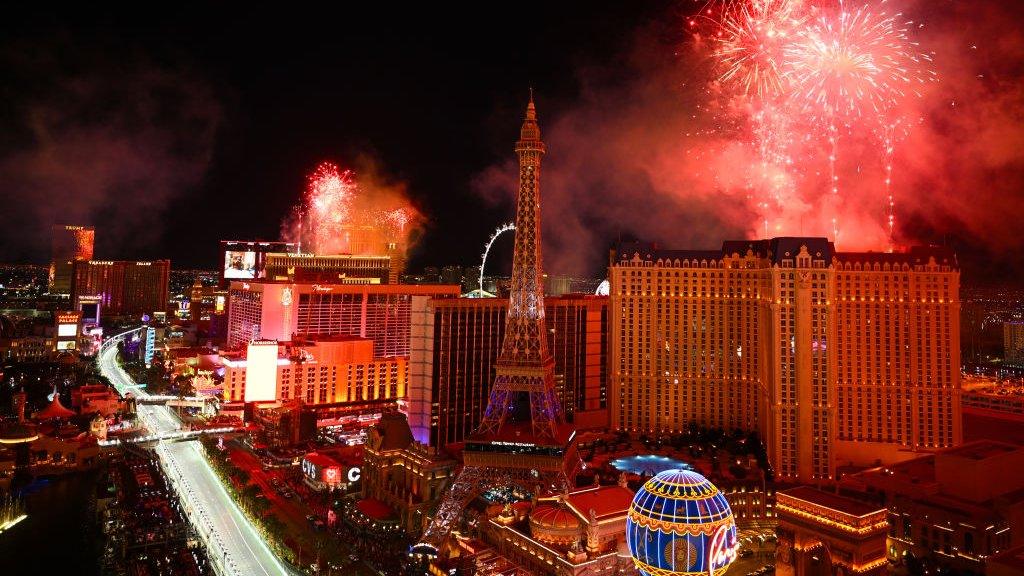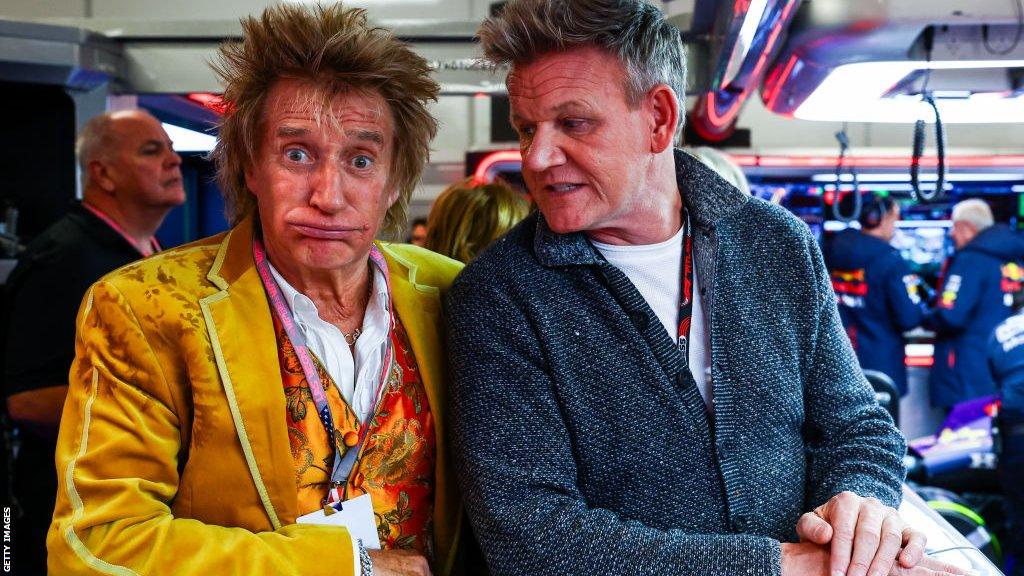F1 Las Vegas Grand Prix: 'It has a 'wow' setting to rival Monaco'
- Published

Some paid $50,000 to watch the race
Max Verstappen started the weekend at the Las Vegas Grand Prix criticising Formula 1's new poster race as being "99% show and 1% sporting event".
He ended it standing on the top of the podium in an Elvis-themed race suit having sung "Viva Las Vegas" on the slowing-down lap.
Verstappen's criticisms were for a long time the focus of a race meeting that veered from chaos to thrilling spectacle. But the longer the weekend went on, the more they faded into the background and the qualities of the event came to the fore.
It would be wrong to say that Verstappen had been entirely won over. But after winning the best race of the season in a thrilling fight at the front with Ferrari's Charles Leclerc and the second Red Bull of Sergio Perez that involved five on-track changes of the lead, he had certainly toned down his views.
"I always expected it to be a good race," he said. "That has never been my issue. But today was fun. That is the only thing I want to say about it. I hope everyone enjoyed it."
Had Verstappen been "got at" by F1's bosses, who were among those who felt his criticisms had gone too far and been ill-judged?
His team boss Christian Horner said the Dutchman "reflects that it is an important event for F1, and the race and the way it delivered today is something he enjoyed."
Asked whether Verstappen's "reflection" had been encouraged by a chat with F1 about the effect his criticism might be having on a race in which the sport has invested £500m of its own money, Horner countered that it had been "adjusted by the race".
Lewis Hamilton, meanwhile, took a thinly-veiled swipe at his 2021 title rival.
"For all those who were so negative about the weekend, saying it was all about show, blah, blah, blah," Hamilton said, "I think Vegas proved them wrong."
A 'wow' setting to rival Monaco
The weekend did not get off to a good start when a drain that worked loose was hit by Carlos Sainz's Ferrari, severely damaging the car and bringing first practice to an end after just nine minutes.
Repairs caused a two and half hour delay to the start of the second session, and that meant F1 had to send the spectators home because security guards had reached the end of their shifts.
Many thought F1's offer to those with one-day tickets for Thursday - of a $200 voucher to spend in the race's official store - was derisory. Nor was there an apology, even if that can be explained by a need not to admit fault in the US, the litigation capital of the world.
But that did not stop the thousands who had flocked to Sin City for this race from enjoying themselves. The famous Strip - the centrepiece of the track - was mobbed by race fans, many of them wearing team gear.
There was a party atmosphere in the city, and the fact the casinos were partners in the race was very clear. What had initially been perceived to be one-sided was not that at all; the relationship was very much mutual.
F1 sees a grand prix with the iconic Las Vegas night-time back drop as a potentially key differentiator as it seeks to grow its presence in the world's largest market, and with cut-through around the world, too. Vegas, meanwhile, sees F1 as part of its strategy to become an international sporting centre.
The city already has the Raiders NFL team and NHL's Golden Knights. And in the days before the race, a deal for the Oakland As baseball team to move to Las Vegas in 2028 was struck. Las Vegas will host the Super Bowl in February. The grand prix is a big part of this strategy.
The plan puts Las Vegas in direct competition with Saudi Arabia, a fight in which the Nevada city has some key advantages.
In addition to the issue of moral concerns over human rights that shroud Saudi Arabia, Las Vegas provides a spectacular setting for a grand prix.
The race exists to make money - both for F1 and Las Vegas. And some of the numbers involved are eye-watering. The Wynn hotel was charging $50,000 for a weekend in F1's Paddock Club, where corporate guests are entertained above the pits.
But the value and quality of some of the packages on offer was also clear. The Bellagio Hotel, one of a number of locations owned by MGM, was offering its own venue for guests to enjoy the race.
A platform was constructed on the famous fountains, a water, lights and music show in a lake in front of the hotel. It was surrounded by the some of the most iconic sites in Las Vegas.
On one side is the Strip, with cars blasting past at 200mph, and the fake Eiffel Tower and Montgolfier balloon of the Paris hotel, the Venetian hotel nearby; on the other the vista of the Bellagio, its fountains, Caesars Palace and other venues.
A three-day ticket costs $11,247. But as a 'wow' moment - whether for ardent F1 fans, wider sports fans, or even those unversed in either - the view rivals even the Monaco harbour on the grand prix calendar.
Before the weekend started, and before the race itself, there were shows on the pit straight. There were concerts by music stars in the city throughout the weekend.
This is the "show" to which Verstappen so vehemently objected. His criticisms contained an essential truth - the Las Vegas Grand Prix very much is largely about the show, and few events bring the importance of money to sport more sharply into focus than this one.
But very few in F1 shared Verstappen's objections; most could see the trade-off would bring benefits.
Leclerc said: "I am especially happy to see we finished this weekend on a high note because it was hurting me to see the sport I love so much starting from the wrong foot. But the fact we had an amazing race makes it all up."
Mercedes F1 boss Toto Wolff said: "That was an awesome weekend. The drain cover was nothing, like I said (on Thursday). Spectacular race, great audiences, mega event, some good racing at the front. That's what I will remember of the inaugural las Vegas race that ticked all the boxes."
Ferrari's Frederic Vasseur added: "This will probably be a new standard for the F1 and I appreciated it. We were a bit scared of the sporting side but it was also probably the best race of the season."

It seemed there were as many celebrities as sports fans in Las Vegas - including Rod Stewart and Gordon Ramsay
'The schedule has been brutal'
For all the obvious success of the inaugural Las Vegas race, there is room for improvement, and the most glaring problem was the schedule.
Qualifying started at midnight, the race at 10pm, two hours later than the equivalent event in Singapore. The fact that the sport is flying straight to Abu Dhabi for the season finale in a week's time - a 12-hour time-zone shift - made it worse.
Everyone in the paddock was like a walking zombie. Everywhere you went, people were talking about how exhausted they were, how difficult it was to deal with a night race where it was necessary to shift time zone, unlike in Singapore where everyone stays on European time. The race was effectively on a Japanese time zone on the western side of the US.
Alpha Tauri driver Daniel Ricciardo spoke for everyone when he said: "For everyone's health and safety, bring it forward."
Horner said: "As a first-off, of course there will be many lessons to learn, and one of the first things we look at is the running schedule because it has been brutal for the team and all the men and women behind the scenes."
Changing it will not be easy, though. The timings were chosen to fit in with the Las Vegas entertainment schedule and to be as friendly as possible for the TV audience in Europe, where the race started at 06:00 in the UK and 07:00 in most of the rest of the continent.
For these two factors, a compromise in the target American market was even made - 22:00 in Las Vegas is 01:00 on the eastern seaboard.
Vasseur said: "It is not easy to find (the right answer) if you want to have decent timing for Asia, Europe, east coast, west coast. Before, F1 was just for the European people and we had to stick to European timing and it was OK. Now, it is a worldwide project and it is much more difficult to find something that fits with the expectation of the 24-hour zone. But we will adjust it."
For a sport that is aiming to go net-zero carbon by 2030, the use of gas burners outside every team hospitality unit in the chill night air was also not a great look.
"Does it have bugs we need to work out?" McLaren Racing chief executive officer Zak Brown said on the grid. "Yes. But what event doesn't? On the whole, it was mega."
